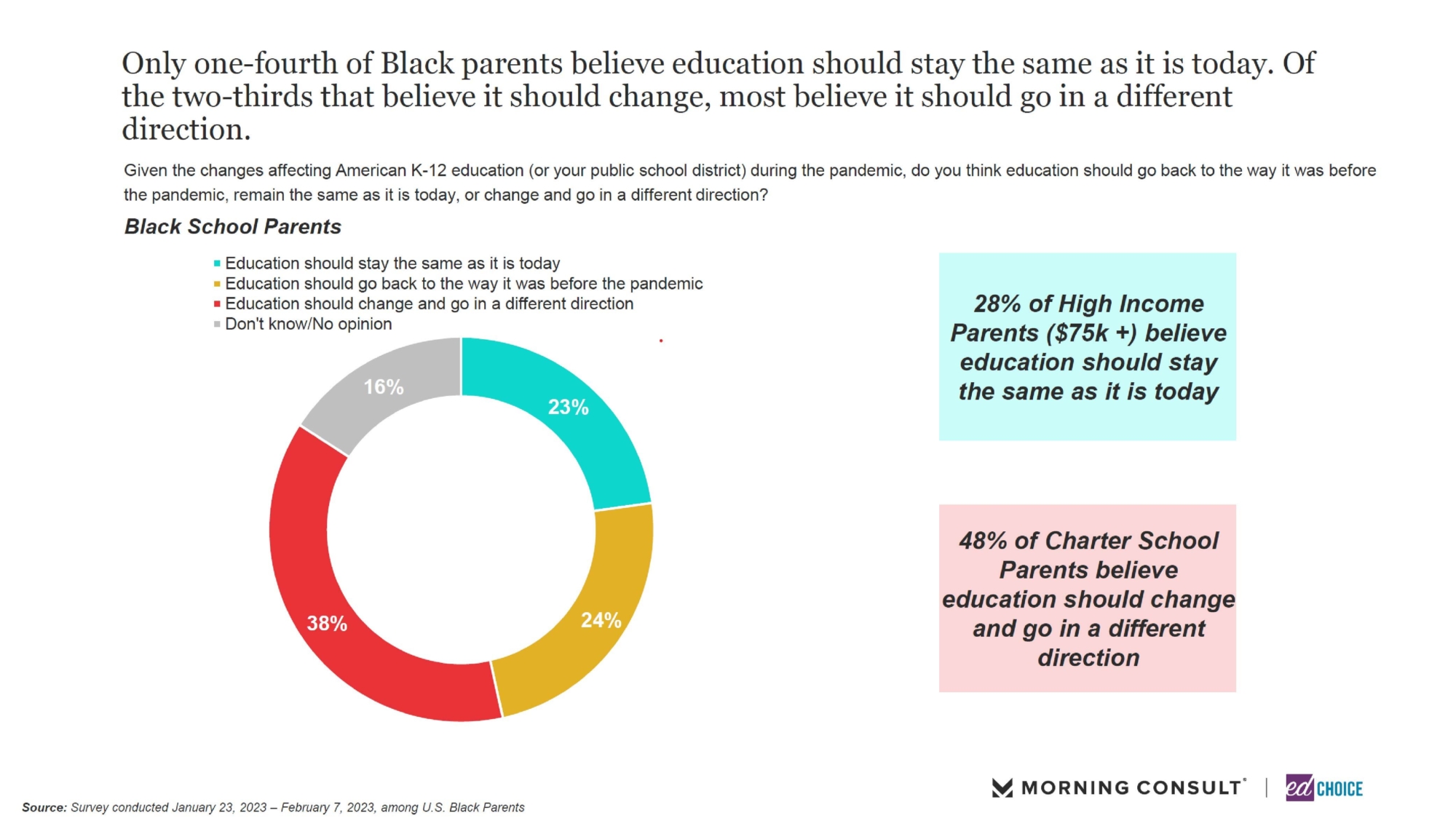Insights from Black Parents on K-12 Education
In the dynamic realm of K-12 education, Black parents are emerging as vocal advocates for choice. According to a new survey of single Black mothers from The Current Project, 86 percent of single Black mothers said they are more likely to support political candidates that support school choice. Furthermore, 56 percent of single Black mothers said they have considered choosing a different school for their child in the past year.
Around this time last year, EdChoice, in partnership with Morning Consult, conducted a survey of Black parents. Many of the findings from that survey provided a clear understanding of the unique perspectives and experiences of Black families about and within K-12 education.
As Black history month is underway, we want to spend some time reflecting on a few of those findings and how they compare to findings from the crosstabs of our most recent survey of school parents from January. Here are some things we learned.
1. Black parents want options in their child’s education. Support for school choice policies like education savings accounts (ESAs), vouchers and charter schools are strong among many demographics, but especially for Black parents. Roughly four in five Black parents support each of the three policies, according to the January 2024 survey of school parents. This high level of support has remained relatively stable over the last year. Additionally, Black parents are, on average, seven points more favorable towards the three school choice policies than school parents generally.

2. Black parents are less optimistic about the direction of K-12 education now compared to a year ago. In January 2024, 55 percent of Black parents felt optimism towards K-12 education in their local school district, 46 percent felt optimistic about K-12 education in their state, and 40 percent felt optimistic about K-12 education nationally. Those levels indicate one-year downward changes of –3 points, -8 points and –1 point, respectively.
This data doesn’t seem too alarming on the surface, as Black parents are still slightly more optimistic than school parents on average. But when you consider how Black parents felt about K-12 education around this time last year, it may be cause for concern as positivity has fallen across all three categories compared to our 2023.

One finding from the survey of Black parents in 2023 could shed some light as to why Black parents are less optimistic. When asked which direction K-12 education should go, 38 percent of Black parents said education should change and go in a different direction. Only 24 percent said education should go back to pre-pandemic ways, while 23 percent said it should stay in its current form. Nearly 2 in 5 Black parents felt the need for change in K-12 education a year ago, and we may be seeing some of that desire for change in the more recent findings.

3. The majority of Black parents prefer having their child learn at home at least one day per week. In January, 54 percent of Black parents preferred some form of a hybrid learning schedule for their child. On the other hand, 46 percent of Black parents prefer the traditional school schedule of learning 5 days per week at school. Interestingly, approximately one in ten Black parents would prefer their child to learn exclusively at home.
4. Black parents trust and rely on schools to provide information about their child’s education. Last summer, in a survey of school parents, we asked how they receive information about their child’s education. Nearly three-fourths of parents said they receive information directly from the school. The crosstabs revealed that Black parents are no exception, with 75 percent saying their information comes directly from the school.
Furthermore, 71 percent of Black parents said they found their child’s school to be a trustworthy source of information about their child’s education and K-12 education generally. Community events (79%) were the only source of information that Black parents reported trusting more than the school itself.
In January, we asked parents what they use to determine whether their child’s school year is a successful one. The data showed that Black parents prioritize two factors when deciding if their child’s school year was successful: communication with their child, and communication with their teacher. It’s yet another reminder that schools are not only trusted to be a safe and effective place for children to learn, but also as a trustworthy source of information for parents.
Visit the EdChoice Public Opinion Tracker site to access past reports, crosstabs, and questionnaires. We update our national and state dashboards every month. We also provide a more in-depth description of our research and survey methods.
Our K–12 education polls archive is updated on a rolling basis, roughly a few times each month. Please don’t hesitate to let us know if we are missing any surveys, or if there are accidental errors.




